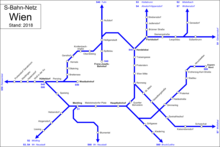Vienna S-Bahn
 |
|||

A cityjet EMU at Wien Floridsdorf
|
|||
| Overview | |||
|---|---|---|---|
| Locale | Vienna, Austria | ||
| Transit type | S-Bahn | ||
| Number of lines | 10 | ||
| Number of stations | 181 (52 of them in Vienna) | ||
| Daily ridership | 300,000 | ||
| Headquarters | Vienna | ||
| Website | Vienna S-Bahn | ||
| Operation | |||
| Began operation | 17 January 1962 | ||
| Operator(s) | ÖBB | ||
| Technical | |||
| Track gauge | 1,435 mm (4 ft 8 1⁄2 in) | ||
| Electrification | 15 kV 16.7 Hz AC Overhead lines | ||
|
|||
The Vienna S-Bahn is a suburban rail rapid transit network in Vienna, Austria. As opposed to the city-run urban metro network, the Vienna U-Bahn, it extends beyond the borders of the city, is operated by the ÖBB (Austrian Federal Railways), and consists of many branch lines. S-Bahn is short for Schnellbahn, which can be translated as "rapid railway".
The Vienna S-Bahn consists of a multitude of branch lines extending beyond the city boundary, most of which converge at a central route segment called the Stammstrecke ("trunk line"). While many of the individual lines run at half-hourly or hourly intervals, they are able to offer combined frequencies of only a few minutes or less along the Stammstrecke. Only line S45 operates entirely within Vienna's boundaries.
Unlike many S-Bahn networks in Germany, the Vienna S-Bahn is not a separate rail network. It is integrated with, and part of, the national railway system. As such, S-Bahn trains share tracks with regional trains (which travel further than the S-Bahn, some regional lines crossing into neighbouring countries) and other rail traffic, including freight trains.
The numbering of the lines has changed since the partial opening of the Wien Hauptbahnhof on 9 December 2012.
No lines except for S45 always have the same route and final station; most have trains that go further and ones that do not.
Planning for an S-Bahn network for Vienna was started in 1954, as a part of reconstruction of the ÖBB. Concrete plans were completed by 1955, but financing was not secured until 1958. The collapse of the investment budget of the ÖBB led to a partial stop of construction in 1960, necessitating a postponing of the grand opening of the network by a little over a year.
The S-Bahn era in Austria began on January 17, 1962. After a day of testing the network with empty trains, passenger transport began at midnight the following day.
From 1962 until 2005, the term S-Bahn was rarely used, the full term Schnellbahn being preferred. Starting with the 2005/2006 timetable, however, S-Bahn has begun to appear in timetables and loudspeaker announcements. Announcements in Badner Bahn trains still use the term Schnellbahn as of 2009.
...
Wikipedia

